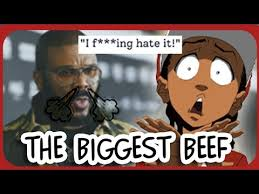FnF News
FNF News | Arts & Society
Published: June 20, 2025
By: Khadija Khan, Senior Culture Writer
So The Boondocks Was Right About Tyler Perry? Media, Morality, and Mixed Messages on Juneteenth and Pride
Los Angeles, CA — “The Boondocks warned us,” one tweet read on June 19, 2025, as viral footage of Tyler Perry making polarizing remarks during a Juneteenth-Pride event resurfaced online. As America celebrated two overlapping cultural moments—Juneteenth, a day marking Black emancipation, and Pride Month, a time honoring LGBTQ+ rights—questions about identity, power, and performative activism resurfaced.
At the center of it all, once again, is Tyler Perry, the billionaire media mogul whose work has long sparked praise, derision, and confusion—sometimes simultaneously. And as America reckons with the legacies of its artists, few are more emblematic of Black Hollywood’s contradictions than Perry.
The Boondocks Episode That Saw It Coming
Back in 2010, The Boondocks, Aaron McGruder’s razor-sharp animated satire, aired an episode titled “Pause”, which featured a thinly veiled parody of Tyler Perry named Winston Jerome. Jerome was a Christian-themed playwright obsessed with dressing as a matriarch and running a cult-like theater company that imposed moral obedience while hiding questionable motives.
Though the episode was quickly pulled from reruns—reportedly after Perry objected to it—the internet never forgot.
“Fifteen years later, it feels less like satire and more like prophecy,” said film critic Malik Andrews. “That episode raised uncomfortable questions about religion, queerness, gender, and exploitation that mainstream media still won’t touch.”
Now, as Perry continues to position himself as a family values figure while expanding his empire into streaming, politics, and education, younger audiences are revisiting The Boondocks as a cultural warning label.
Pride, Juneteenth, and the Paradox of Performative Power
The 2025 Freedom & Unity Gala in Atlanta—co-sponsored by the National Black Justice Coalition and several LGBTQ+ nonprofits—was meant to be a unifying moment, celebrating Black liberation and LGBTQ+ visibility. But Perry’s speech, which included lines about “bringing America back to God” and subtle digs at “secular pride,” struck many as tone-deaf and coded.
“He always walks that line between affirmation and erasure,” said Darnell May, an LGBTQ+ organizer who attended the event. “You can’t claim to uplift all people while subtly condemning parts of their identity.”
The controversy reignited a decade-old debate: Is Tyler Perry a cultural savior for the Black working class, or a gatekeeper selling morality wrapped in drag and scripture?
Tyler Perry’s Complicated Legacy
To his credit, Perry is one of the most successful Black media entrepreneurs in American history. His Atlanta-based Tyler Perry Studios employs hundreds of people, many of them Black. His movies and plays have generated billions in revenue and speak directly to audiences often overlooked by Hollywood.
Yet his artistic output—particularly the Madea franchise—has long faced criticism for gender caricature, Christian moralizing, and homophobic undertones. Even some of his collaborators have admitted the roles walk a fine line.
“Perry’s work is a complicated mirror,” said NYU media professor Jasmine Cole. “It reflects certain truths about Black life, but also reinforces ideas about gender roles and sexuality that many younger Black audiences find outdated or even dangerous.”
So Was The Boondocks Right?
While The Boondocks didn’t accuse Perry of any specific wrongdoing, the episode’s themes—cultish behavior, the commodification of trauma, and repression masked as righteousness—resonate more than ever.
“Winston Jerome wasn’t about outing anyone,” said Aaron McGruder in a rare interview from 2022. “It was about asking why our heroes are often above critique—and why we’re afraid to challenge the morality industry.”
Today, social media seems to agree. A trending hashtag, #BoondocksWasRight, accompanied thousands of memes, including screengrabs of Perry juxtaposed with the cartoon’s exaggerated villain.
What Comes Next?
For many Black and LGBTQ+ Americans, Pride and Juneteenth represent liberation from imposed identities and inherited silence. When those two legacies overlap, the contradictions of figures like Perry become harder to ignore.
Younger Black creators—like Issa Rae, Donald Glover, and Lena Waithe—are now leading the charge for narratives that embrace complexity without moral panic. And Perry’s influence, while still massive, is increasingly being questioned by a generation that demands truth over respectability.
“At some point, Black excellence must include accountability,” said writer Keshawn Taylor. “That means challenging even the kings of the culture.”
Conclusion: Freedom Means Asking Hard Questions
As America celebrates its long road to freedom—whether from slavery or social repression—voices from the margins are reminding us: true liberation is not just about representation. It’s about honesty.
Tyler Perry remains an icon. But even icons can be challenged. If Juneteenth teaches us anything, it’s that freedom delayed is not freedom denied—and sometimes, satire tells the truth before we’re ready to hear it.

